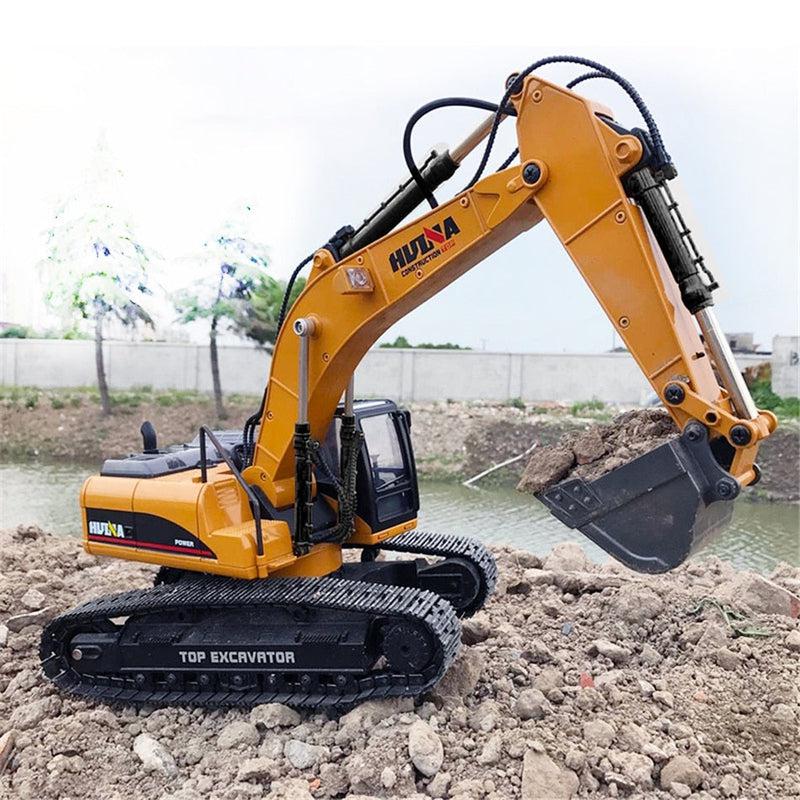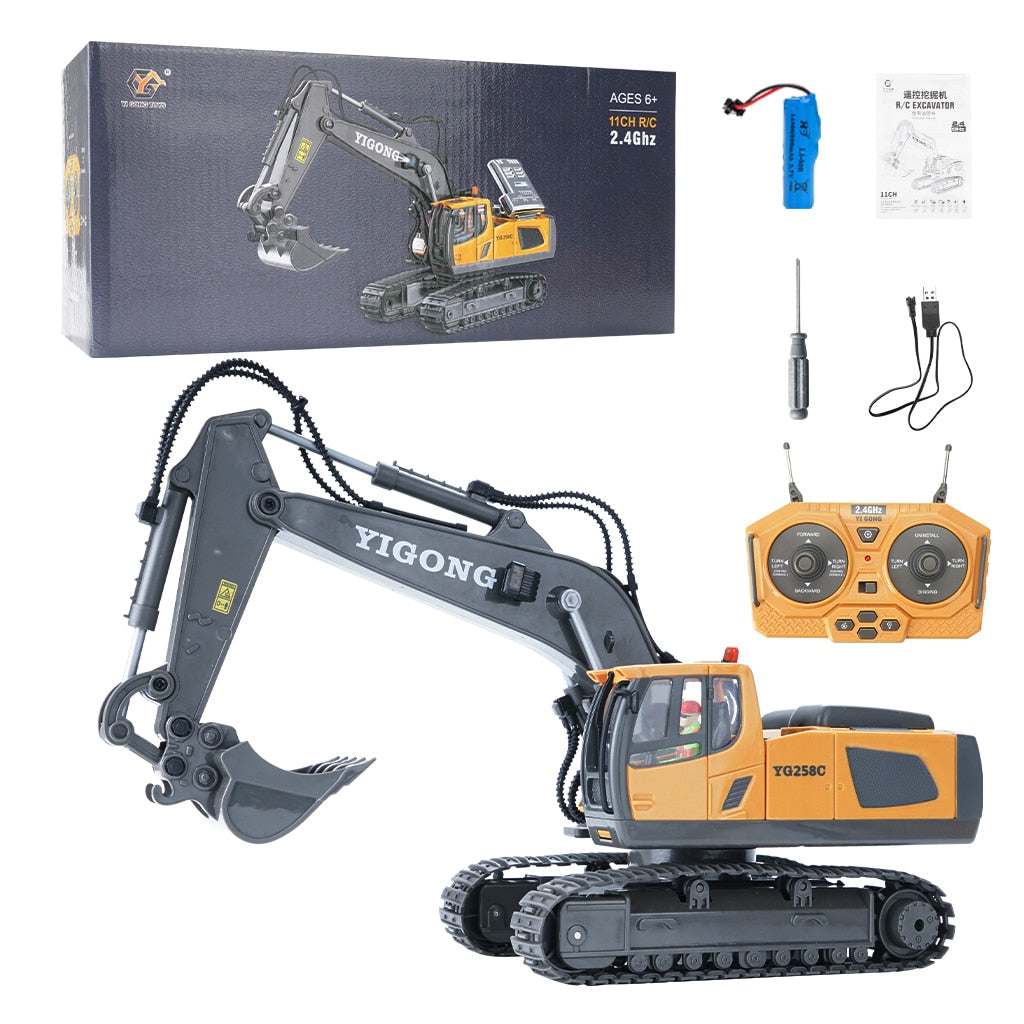Understanding Just How Excavator Functions and Its Impact on Effectiveness
Excavators play a vital role in building and construction and mining operations, relying upon a complicated interplay of mechanical and hydraulic systems. Their ability to do a variety of tasks depends upon both their style and the innovation incorporated within. Understanding these parts can substantially impact functional effectiveness and performance. As improvements remain to improve the sector, one must take into consideration just how these modifications will certainly affect future practices and performance.
The Essentials of Excavator Mechanics

The Function of Hydraulic Systems in Excavators
At the heart of excavator procedure lies the hydraulic system, which plays a critical function in powering the maker's movements and functions. This system utilizes pressurized hydraulic liquid to move energy, making it possible for different actions such as swinging, training, and excavating. By using the principles of hydraulics, excavators can do tasks with remarkable precision and pressure, enhancing total functional efficiency.The hydraulic system contains vital components, consisting of valves, cylinders, and pumps, which function together to manage the flow and direction of the fluid. When the operator engages the controls, the hydraulic fluid is directed to specific cylinders, translating the driver's commands right into physical motion. This device enables for responsive and smooth actions, which are crucial in building and excavation environments. double e volvo rc excavator. The effectiveness of the hydraulic system straight influences the efficiency and flexibility of the excavator, making it an important element in modern excavation procedures
Trick Parts of an Excavator
Recognizing the essential components of an excavator is vital for grasping how this powerful device runs. An excavator includes numerous considerable components, consisting of the undercarriage, home, boom, arm, and pail. The undercarriage gives security and movement, usually featuring tracks or wheels to navigate numerous terrains. The home consists of the engine and hydraulic systems, enabling the driver to manage activity and power the machine. The boom prolongs from the home, making it possible for upright reach, while the arm links to the bucket, promoting excavating and lifting operations.Additionally, the taxicab houses the driver, furnished with controls for exact maneuvering. Each of these components plays an important function in the excavator's general performance, adding to its effectiveness and performance on construction websites. Understanding these parts aids in maintaining and enhancing excavator efficiency, making sure tasks are finished securely and efficiently.
Accessory Flexibility and Its Benefits
Attachment versatility is a necessary facet of excavators, making it possible for drivers to change between different tools tailored for particular jobs. This flexibility not only boosts task efficiency however additionally adds to cost-effectiveness by decreasing the requirement for several devices. Recognizing the different kinds of accessories readily available can greatly affect the overall performance and capability of an excavator on work websites.
Kinds of Accessories
While excavators are primarily identified for their digging capacities, their true flexibility lies in the vast range of attachments available. These attachments boost the excavator's capability, permitting it to perform different jobs past excavation. Usual attachments include buckets (for excavating and scooping), hydraulic thumbs (for grasping materials), and augers (for piercing holes) Grapples are made use of for relocating and taking care of debris, while rippers can damage up tough surfaces. Various other specialized attachments, such as trenchers and rakes, allow excavators to adapt to details job needs. This diversity not just boosts the device's energy throughout different fields, including building and construction, demolition, and landscaping, however likewise enables operators to customize their devices to satisfy details job demands effectively.
Increased Work Effectiveness
Making best use of work performance is a key advantage of utilizing different excavator accessories. Different attachments allow an excavator to do numerous jobs without requiring to switch equipment, conserving beneficial time and labor. Using a hydraulic hammer can damage concrete while a pail add-on can dig deep into dirt, making it possible for a seamless process. This convenience minimizes downtime connected with equipment adjustments and enhances productivity on-site. Additionally, specialized accessories improve accuracy in tasks such as grading or landscaping, leading to better end results. The capability to adapt to different work needs not just simplifies procedures but likewise decreases the need for added equipment, ensuring that jobs are finished promptly and effectively. Generally, attachment adaptability significantly adds to increased task performance in excavation job.
Cost-Effectiveness and Flexibility
Cost-effectiveness is a significant benefit of using functional excavator attachments. These accessories permit a single excavator to execute multiple tasks, lowering the need for extra machinery and labor - double e volvo rc excavator. By switching over between pails, hammers, and grapples, operators can tackle different jobs, from digging to demolition, thus making the most of tools utilization. This adaptability not only reduces functional expenses yet additionally lessens downtime connected with altering equipment. Additionally, the ability to tailor excavators with specialized accessories boosts performance, as they can efficiently manage varied tasks according to job demands. To wrap up, the combination of cost-effectiveness and convenience in excavator attachments contributes to boosted operational performance and source allocation in construction and excavation projects

Advanced Technology in Modern Excavators
Modern excavators are increasingly furnished with sophisticated innovation that transforms excavation procedures. Automation streamlines procedures, while boosted gas performance reduces functional prices. Additionally, clever control systems enhance accuracy and safety, noting a substantial evolution in excavation tools.
Automation in Excavation Processes
As excavation technology evolves, automation has emerged as a crucial part in improving performance and accuracy on work sites. Modern excavators are furnished with advanced automated systems that assist in jobs such as grading, excavating, and trenching with very little driver treatment. These systems utilize sensors, GPS, and equipment understanding algorithms to assure exact positioning and depth control, substantially lowering the margin for error. Additionally, automation allows drivers to concentrate on tactical decision-making instead than manual controls, leading to boosted performance overall. Such developments not just improve process but likewise enhance safety and security by minimizing human mistake in complicated procedures. Subsequently, the assimilation of automation in excavation processes stands for a significant improvement in building and construction modern technology, driving the market in the direction of higher efficiency and performance.
Improved Fuel Performance
Innovations in modern technology have likewise brought about significant renovations in fuel efficiency for contemporary excavators. Modern machines are equipped with advanced engines that enhance power outcome while decreasing fuel usage. These engines make use of cutting-edge burning technologies, such as turbocharging and direct fuel injection, to enhance efficiency and efficiency. Furthermore, light-weight materials in building minimize total weight, permitting for much less power expenditure throughout operation. The intro of variable rate controls allows operators to change engine performance according to details jobs, better reducing gas usage. Because of this, these improvements not just reduced functional costs however also contribute to environmental sustainability by reducing exhausts. In general, enhanced fuel efficiency in excavators is a Web Site necessary advancement that bolsters efficiency and economic feasibility in the building market.
Smart Control Systems
While operators browse significantly intricate work sites, smart control systems in excavators have actually arised as essential devices for enhancing efficiency and accuracy. These innovative innovations utilize sensors and formulas to monitor different parameters such as tons weight, terrain problems, and functional efficiency. By immediately adjusting hydraulic features, wise systems enhance device performance, bring about enhanced productivity and minimized wear on parts. In addition, drivers gain from user-friendly interfaces that give real-time comments and diagnostics, enabling informed decision-making. This integration of technology not just enhances procedures but additionally minimizes human mistake, contributing to much safer workplace. As the building industry continues to develop, clever control systems will certainly play an important function in shaping the future of excavator performance and efficiency.
Enhancing Operational Performance With Excavators
Excavators play an essential duty in boosting functional effectiveness throughout various building and construction and excavation jobs. Their convenience permits multiple jobs, including material, excavating, and training handling, which improves operations and decreases the need for added devices. With powerful hydraulic systems, excavators can execute heavy-duty jobs with accuracy, substantially reducing the moment required to total tasks. The assimilation of sophisticated modern technology, such as GPS and automated controls, better maximizes their operation, allowing operators to achieve higher accuracy and minimize material waste. Furthermore, modern-day excavators are created to take in less fuel and decrease exhausts, adding to both expense savings and environmental sustainability. By making use of excavators properly, construction groups can enhance performance, fulfill task target dates, and improve total website monitoring. This multifunctionality and effectiveness make excavators vital devices in the modern building and construction landscape.
The Future of Excavators in Construction and Mining Industries
As the building and mining sectors progress, the future of excavators is poised for substantial improvement driven by technological advancement and transforming operational needs. Developments in automation and synthetic intelligence are reshaping excavator capacities, permitting enhanced precision and efficiency in operations. Autonomous excavators are arising, reducing the need for human intervention and lessening the danger of accidents.Moreover, the assimilation of telematics and IoT modern technology allows real-time surveillance of machine performance and anticipating upkeep, optimizing uptime. Eco-friendly styles, consisting of hybrid and electric designs, are gaining grip, aligning with sustainability goals within the industry.Additionally, the use of sophisticated materials and lighter layouts boosts gas efficiency while preserving efficiency requirements. As these fads progress, excavators will certainly play a vital role in meeting the increasing needs for efficiency and security in building and imp source mining, inevitably changing operational landscapes.
Regularly Asked Questions
Exactly How Do Weather Influence Excavator Efficiency?

Climate condition substantially influence excavator efficiency, as rainfall and mud can prevent grip and stability, while extreme temperature levels might affect hydraulic systems. Operators should adapt to my review here these variables to ensure suitable functionality and safety and security during operations.
What Security Measures Should Operators Adhere To While Using Excavators?
Precaution for excavator drivers include putting on suitable individual safety equipment, performing pre-operation examinations, making certain appropriate communication with ground workers, preserving a risk-free range from overhead hazards, and adhering to well established operational procedures to avoid accidents.
How Usually Should Excavators Be Kept for Optimum Performance?
Excavators should be kept routinely to ensure peak performance, commonly every 250 operating hours or as specified by the maker. Routine checks boost integrity, stop unexpected breakdowns, and expand the life expectancy of the devices.
What Is the Typical Life-span of an Excavator?
The ordinary life expectancy of an excavator commonly ranges from 10,000 to 15,000 hours of operation. Variables influencing long life consist of maintenance practices, operating problems, and the quality of the maker itself, influencing general performance and effectiveness.

Can Excavators Operate on Irregular Surface Properly?
Excavators can operate successfully on uneven surface because of their articulated designs and adjustable tracks. These functions permit them to keep security and traction, enabling efficient procedure in difficult atmospheres frequently encountered in construction and landscape design jobs. Each of these parts plays an important duty in the excavator's general functionality, contributing to its performance and effectiveness on building sites. Optimizing task performance is a key advantage of utilizing various excavator add-ons. While operators browse significantly complicated work websites, smart control systems in excavators have emerged as important tools for improving efficiency and accuracy. Excavators play a crucial role in boosting operational efficiency throughout various building and construction and excavation projects. Advancements in automation and synthetic knowledge are improving excavator capabilities, enabling for improved precision and effectiveness in operations.